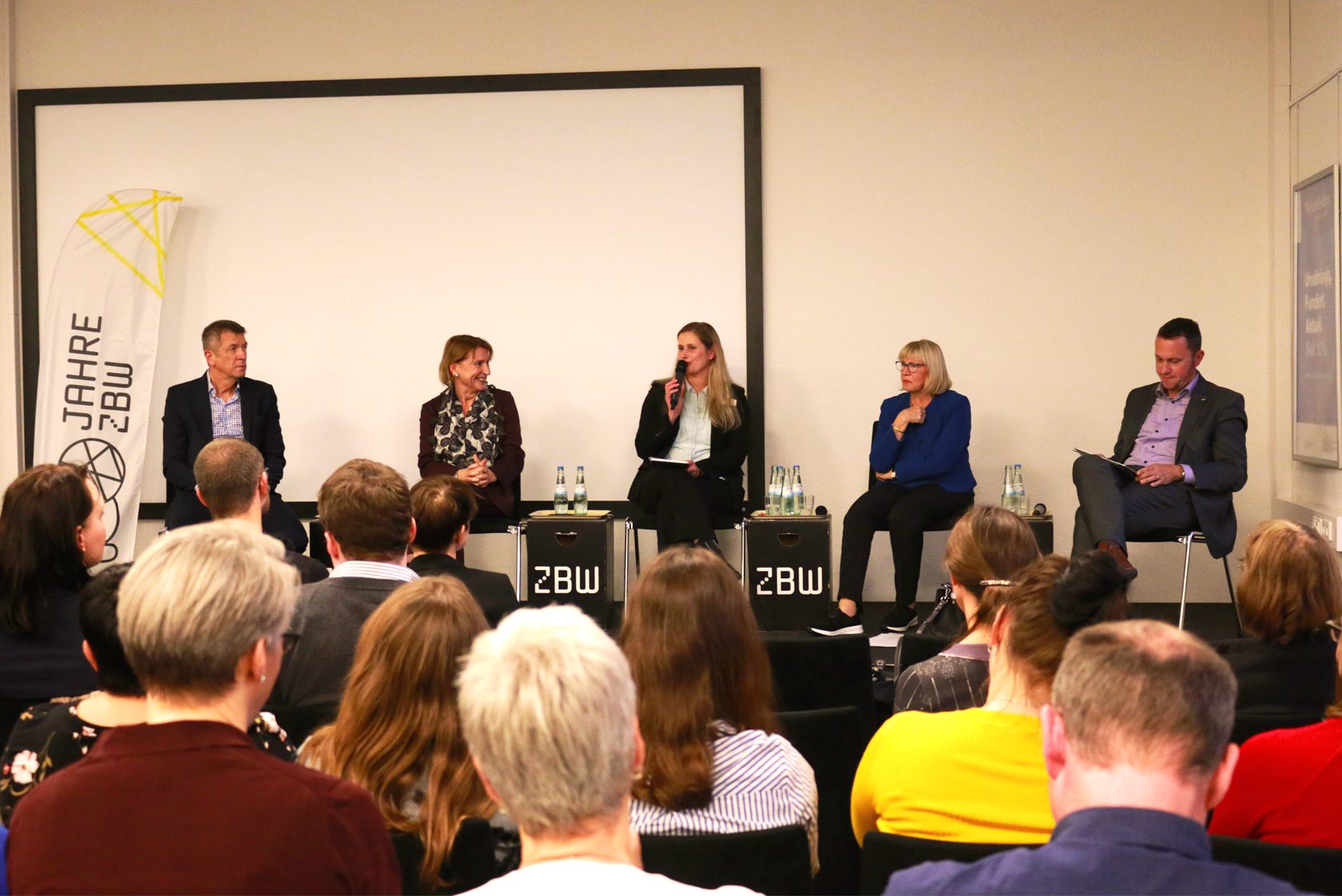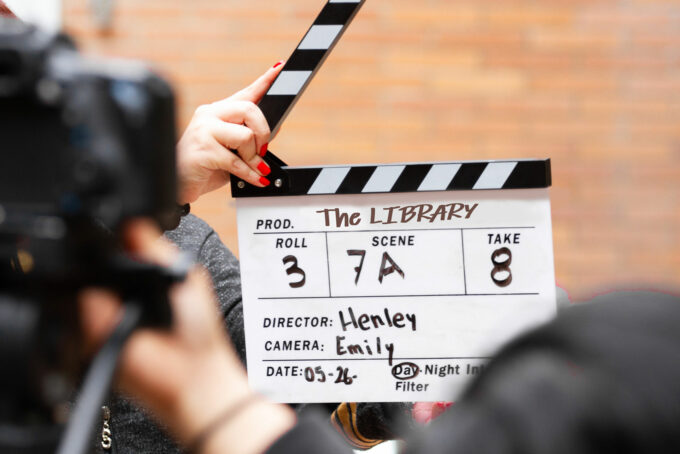
Podium Discussion: Perspectives for “Libraries 2050”
15 years ago, people thought that the future of libraries was rather grim. Now they are more popular than ever – and particularly as learning environments. What tasks will libraries be facing in the year 2050? And what meaning do they have for their target groups?
by Nicole Clasen, Birgit Fingerle and Dr Doreen Siegfried
A podium discussion (link in German language) on the topic of “Libraries 2050” was held on 21 October 2019 in the ZBW Hamburg as part of the ZBW anniversary year. The panel consisted of Barbara Lison, director of Bremen Public Library and designated president of IFLA; Dr Ute Krauß-Leichert, Hamburg University of Applied Sciences; Volker Heller, chairman and management director of the ZLB (Berlin Central & Regional Library) Foundation; and Thorsten Meyer, chief librarian of the ZBW. The podium discussion was moderated by Nicole Clasen from ZBW. We have summarised some aspects of libraries 2050 below.
Audio recording of the podium discussion (in German language)
What significance will libraries have for their target groups in the future?
Barbara Lison sees spectacular libraries that have been or are currently being built abroad as being role models for libraries in 2050. These include the DOKK1 english in Aarhus, OODI in Helsinki and LocHal in Tilburg. She also stresses the importance of involving future users in the planning.
For Volker Heller, a library must always serve the needs of society; otherwise, it has no meaning. In principle, there are three fundamental needs that are essential for libraries to meet: first, the desire for an “analogue” (meaning physical) space; second, the desire for a place to meet other people and third, the desire to expand one’s knowledge and abilities. That is why it is so essential for libraries to be open on Sundays.
Thorsten Meyer emphasises the aspect that, on the one hand, libraries are important both as spaces, and also as places of mobile detox and concentration. On the other hand, the term “library” does not quite fit these spaces anymore, as they are developing more and more into “information infrastructure institutions”.
What personnel will libraries need in 2050?
For Barbara Lison, personnel is an important issue of “Libraries 2050”. The personnel should not be made up of only professional librarians, but instead be much more diverse than is the case today.
According to Professor Ute Krauß-Leichert, it is important to emphasise more diverse focus areas in the future during training. Advanced training and continuing training are also extremely important.
Volker Holler also emphasises that there are many skills required. Moving away from a single kind of training would be desirable. Why should not one recommend that specialists for media and information services (known as FaMIs in German) study something else such as community management or communication sciences?
Thorsten Meyer sees professional librarians as taking on more of a coordinating role. Libraries also need more IT skills, but are subject to intense competition by commercial enterprises, and therefore need to highlight their advantages as employers in particular.
In view of the many new skills required, where could libraries relinquish old skills?
Volker Heller anticipates that manual tasks regarding the collections (for instance cataloguing) will decrease. Many of these can be replaced by partnerships with service providers or other libraries to create more time for the patrons. He describes the collaboration between public libraries at a national level as immensely important. There is currently a huge void here because there are neither national players nor consortia of public libraries as it is the case with the academic libraries.
According to Thorsten Meyer, libraries will continue to stay true to their core mission. In the future libraries will continue to process knowledge and make it available. But to make them future-proof, it is important to give up unnecessary business routines and work steps. One should always ask the following question about the own library: how do we provide the greatest usefulness to users? And sometimes another institution can do a given task better. In that case, we should join forces and thereby have more time to dedicate to the actual patrons.
What needs to happen at a political and funding institution level to make libraries ready for 2050?
Barbara Lison believes that cultural sovereignty of German federal states represents a limiting factor and that it will definitely no longer exist in the year 2050. Or will it? If libraries were to offer coffee with a place to sit down, maybe they would at last be open on Sundays like bakeries are now allowed to do.
Volker Heller reports that the Berlin Central & Regional Library is open 347 days a year and asks the question, why not also at Christmas, for lonely people? If there is a need, libraries should really take consistent action to meet it. Visiting the library on Sundays is popular with its patrons, including many families who visit, and a generally very relaxed ambiance.
Dr Ute Krauß-Leichert sees libraries as being heavily involved in digital issues. But because this is not seen from the outside, they must communicate it more strongly so that others – above all, those who provide funding – can also experience what libraries do.
From the point of view of Barbara Lison, Germany lacks support on a national level and of a central institution. By contrast, public libraries in the Netherlands have been equipped for digital literacy in the context of a major project.
Libraries set the course for 2050
The podium discussion showed that libraries are setting the course for future-oriented further development. They are designing their multifaceted tasks for and with their users in order to do this. A key success factor will be tailored advanced and further training for their own employees.
View Comments

Discussion paper: New indicators for Open Science and Open Innovation
Established indicators for research and innovation processes do not sufficiently...



